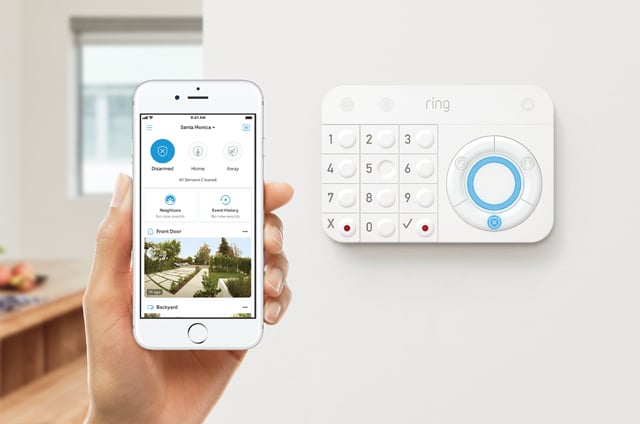A Silicon Beach outfit recently acquired by Amazon.com Inc. has started a broader push to disrupt the home security market.
Santa Monica-based Ring Inc. made the first shipments of its new home security product, called Ring Alarm, with a $199 price point that makes it far cheaper than most traditional home security systems.
Six-year-old Ring –which was acquired by Amazon for $1.2 billion in April – first made waves with a camera-equipped doorbell. Its Ring Alarm adds to its product portfolio by offering a keypad and sensors that work with cameras the company offers.
There’s a catch or two – the cameras aren’t part of the $199 price tag for the basic Ring Alarm kit, homeowners have to install the system themselves, and monitoring by a third-party security firm costs extra and does not include any response to potential threats.”
Some security professionals, meanwhile, report mixed results from the growing do-it-yourself segment of the security –a roster that includes Nest Labs Inc., SkyBell Technologies Inc., and Arlo Group Ltd., among others. The DIYers have gained traction in the market place, according Donald Moore, owner and president of Moore Protection in Redondo Beach, which specializes in high-end residential properties.
But homeowner satisfaction with the new products is far from universal, said Moore, who’s been in the business since 1981.
“Many of my clients have these type of devices, and approximately half of them are happy with it,” he said. “About half are frustrated with its performance.”
A statement by Ring tied to the July 4 product launch said the overall goal of the company is to help homeowners combat crime. A spokeswoman for Ring declined to comment on how it was handling industry or customer complaints.
Ring Alarm comes with a keypad, range extender, base station, motion sensor and contact sensor. Additional sensors – which can be placed on doors or windows – cost roughly $20-$30 each.
The alarm system can be monitored and controlled by the customer through a smart phone app. It also can be connected with the security cameras that Ring offers separately.
Ring does not employ any monitoring or in-house threat-response team, though customers can download their cloud-stored security footage and professional video monitoring from one of Ring’s two protection plans for an additional $3 to $10 per month
Ring security systems are not connected to local law enforcement agencies without the monitoring service, leaving it to homeowners to contact authorities.
Ring security systems offer support agents who call your home if an alarm goes off, Shahmiri said. If an emergency is confirmed, the agent can request local authorities come inspect the home.
Security experts estimate Ring’s policy of not immediately contacting law enforcement saves homeowners from customary fees charged for false alarms – the Los Angeles Police Department charges $189 for officers responding to a false alarm alarms, and levies increase up to $589 if there are repeated calls.
Cloud concerns
The DYI appeal of the system – as well as the company’s smartphone-connected features and cloud-based data storage system – also are potential weak points, according to some security experts.
Jeff Zisner, owner and private security investigator at Aegis Security Inc. in Culver City, expressed concerns that cloud storage – though a popular selling point in most technology – might not be the most secure option for a security system.
“When you tie into a cloud-based system, by definition there are more connection points that have the potential for failure and infiltration,” Zisner said.
Zisner warned of the need for customers to stay on top of some of the potential pitfalls that come with smart-home security.
“Having solid credentials, multiple strong passwords, changing default passwords, having your phone lock automatically, and requiring a passcode or fingerprint,” Zisner. “That goes into layers of security, and that’s things we hope clients we’re consulting with do.”
Ring spokeswoman Yassi Shahmiri said in an email the company employs an in-house security team as well as external firms who help test their devices.
“As a security company, security is at the core of Ring’s mission and drives everything they do,” Shahmiri said.
Cost consideration
Ring Alarm’s relatively low price point – Nest Labs Inc. sells a comparable product for $399 – is driving adoption.
Zisner said most traditional home security systems are based on the same package of door and window contact points and motion sensors and can cost “hundreds to thousands of dollars for installation, depending on space.”
He said it’s nearly impossible to find traditional security monitoring as inexpensive as Ring’s offerings.
“It’s a less expensive solution and typically the installation costs are less, versus a traditional home security system, or CCTV system [which] needs a professional to install it,” Zisner said.
Local home security firms aren’t worried about Ring’s expansion and upcoming shipping plan pushing them out of business, however.
“Those of us who have been working in this business for many years have seen a plethora of other industries target the security business, from telephone and cable companies to utilities,” said Moore. “They decide that the security market is ripe to flood with millions of dollars in advertising so they can take over, but what it ends up doing is raising people’s security awareness in general, which is great for all of us.”

